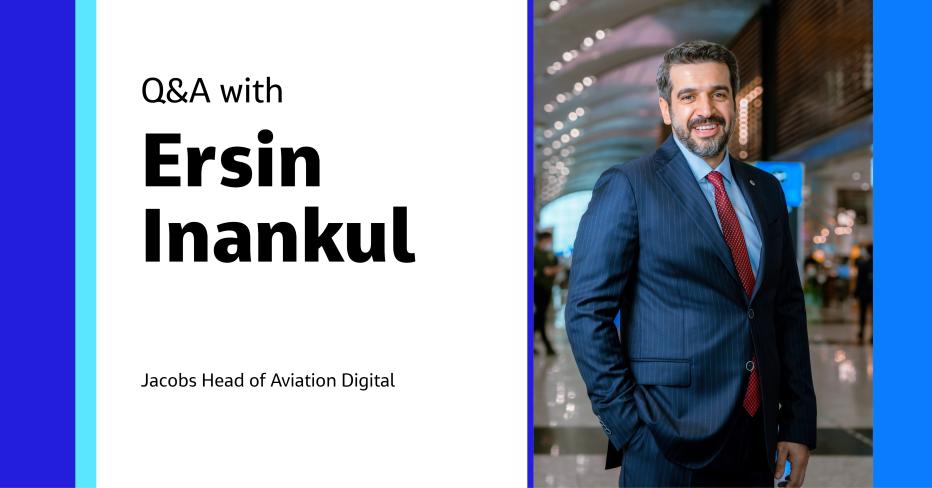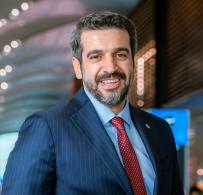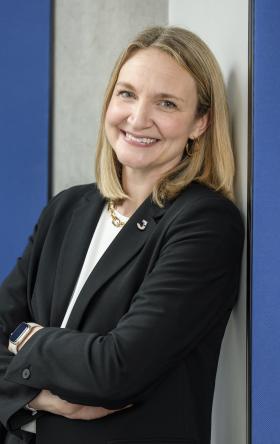
Our Head of Aviation Digital, Ersin Inankul, has an extensive background in designing, developing, implementing, maintaining and running advanced airport solutions for corporations.
With over 20 years of expertise in the aviation sector, he excels in strategic planning and leadership, enterprise-wide technology upgrades, project and program management and change and release management.
We spoke to Ersin to gain insights into the impact of digital technologies on the aviation industry in the coming decade. We also discussed how these technologies can improve passenger experience and safety, as well as make aviation more sustainable, ultimately reducing the industry's environmental footprint.
Hi, Ersin! Tell us a bit about yourself and your role at Jacobs.
I was born in Turkey and currently reside in Dubai with my wife and two sons. I hold a degree in electronical engineering, a master’s in computer science and an MBA in finance. Aviation, technology and nature are my passions. Before joining Jacobs, I had 25 years of technological expertise, beginning as a software developer and working in aviation for the last 20 years.
I have worked as a designer, consultant and project manager on numerous mega airport projects in regions such as Qatar, Muscat, Abu Dhabi and Istanbul. I’ve even had the opportunity to establish and work as general manager at two aviation systems companies where we delivered 22 applications that are today used by 70 airports.
In my role today, I put together digital approaches to systematically identify opportunities for airports and airlines to benefit from digital technologies and prioritize initiatives that generate the most value. By understanding the needs of both end-users and airport and airline operations, we align digital requirements with existing plans for digitalization to ensure a cohesive and effective approach.
How do you envision digital technologies transforming the aviation industry over the next decade?
By 2050, airports are set to be transformed by digital technologies.
Artificial intelligence (AI-powered) automation will make routine airport processes entirely autonomous, from check-in to security – reducing waiting times and enhancing passenger experiences. Intermodal connectivity will transform operations by connecting air, ground and vertical transport. Touchless travel and biometric IDs will simplify security and boarding procedures. Airports will serve as energy hubs, providing clean energy and implementing sustainable aviation technologies. The idea of "aerotropolises" will increase revenue streams, while data-driven efficiency will enhance operations and community engagement will prioritize balanced development.
Digital technologies such as AI, Internet of Things (IoT), 5G, healthcare integration, sustainable energy, quantum computing, and human-machine interaction will converge in the next decade to transform the aviation industry.
How are digital solutions enhancing passenger experience and safety?
An outstanding digital solution to improve passenger experience and security is the implementation of advanced biometric authentication at airports. This technology, combined with touchless digital ID cards linked with biometric data, transforms security and boarding procedures, guaranteeing passengers a seamless and trouble-free airport experience.
Passengers can seamlessly complete check-in and security processes thanks to AI-driven automation, reducing wait times and increasing efficiency. Using biometric technology for authentication enhances security and minimizes physical contact, which is crucial during health concerns like the pandemic.
Additionally, introducing advanced healthcare solutions in airports is expected to enhance passenger safety significantly. Health screening zones, telemedicine centers and contactless biometric authentication points are now essential for airport infrastructure, increasing passengers' trust in health and safety measures.
How can digital advancements help make aviation more sustainable and reduce the industry's environmental footprint?
Intermodal connectivity will be crucial in connecting air, ground and potentially vertical transportation, such as drones and urban air mobility (UAM), creating efficient and sustainable intermodal hubs.
As airports look to prioritize sustainable operations, they’ll look to transform into energy hubs, delivering clean energy to users and communities, embracing hydrogen and electric aircraft to cut emissions drastically. The emergence of "aerotropolises" will help reshape airports into dynamic urban campuses, diversifying revenue streams and reducing the industry's dependence on aviation-related revenues.
Data solutions like AI, IoT, quantum computing and human-machine interaction will also fuel an efficient, sustainable and passenger-focused travel ecosystem while reducing the aviation industry's environmental impact.
“Digital technologies such as AI, IoT, 5G, healthcare integration, sustainable energy, quantum computing and human-machine interaction will converge in the next decade to transform the aviation industry.”
Can digital solutions be added into existing aviation infrastructure without disrupting daily operations?
It certainly can with careful planning, phased implementation and broad stakeholder involvement. Prioritizing projects, rigorous testing and thorough staff training are integral to this process.
Interoperability, reliable backup systems and compliance with regulatory standards are all crucial components, too. The efforts require continuous monitoring and assessing of performance to enable adjustments, with cybersecurity measures and contingency plans mitigating against potential disruptions. Cooperation and knowledge exchange among stakeholders throughout the effort encourages the adoption of best practices and facilitates a seamless transition to a digitally advanced aviation infrastructure that improves efficiency and enhances the passenger experience while ensuring operational continuity.
The aviation industry in the Middle East is expected to experience rapid growth and become one of the fastest-growing airline markets. What is your perspective on the opportunities ahead?
The Middle East is a crucial global center, interconnecting Asia, Europe, Africa and beyond – and its geographic location is a key driver of its aviation sector growth. Airlines based in the Middle East, such as Emirates, Qatar Airways, Saudi and Etihad Airways, have used their advantageous position to establish themselves as key players in the global aviation sector. With the continued expansion of international trade and travel, the Middle East is poised to play an increasingly vital role in facilitating air connectivity.
Moreover, the Middle East's dedication to innovation and world-class infrastructure development has been a defining characteristic of the region's aviation growth, with cities such as Dubai, Riyadh and Doha investing heavily in building state-of-the-art airports that attract travelers with modern amenities and services.
Such initiatives benefit passenger experience and enhance the region's attractiveness as a transit hub. The continuing expansion of airports and the implementation of new technologies such as biometrics, smart retailing and AI will contribute to improved operational efficiency and passenger convenience. This improvement will provide us with new opportunities to play a significant role in providing our dedicated digital services to the aviation industry.
What do you find the most challenging part of your role?
In today's world, rapid technological advances, particularly in areas such as artificial intelligence, automation and cybersecurity, can be both exhilarating and daunting. As a leader, I need to stay updated on these advancements and turn them into opportunities for progress. But the aviation industry, known for its stringent security and regulatory requirements, adds an extra layer of complexity. Finding the right balance between promoting new ideas and adhering to strict standards can be challenging.
However, that's not the only challenge. Coordinating different teams and stakeholders to ensure that each project is delivered on time, within budget and to the highest quality standards takes special skills. My role is akin to flying a plane through turbulence and safely reaching the destination.
Keeping up with the latest trends and technologies is crucial. I must consistently learn and adjust to offer valuable guidance for enhancing operations and profits in the aviation industry. My job entails more than just reacting to changes in the industry. It requires actively shaping and driving digital innovation across different areas of aviation.
Fundamentally, I need to balance technical expertise, strategic thinking and excellent project management. It's a very dynamic and safety-critical environment where precision and innovation must co-exist. I aim to continue to navigate this complex landscape in the pursuit of excellence, using technology to improve aviation while ensuring the highest safety and compliance standards.
-

Cycling
-

Outstanding Achievement Award, at the FTE Airport Transformation Power List EMEA, 2022
-

Deep diving in Marmaris, Turkey
If you aren’t working, what would we be most likely to find you doing?
I feel a deep connection with nature whenever I step outside and enjoy its beauty. I am an outdoors enthusiast and love to be actively involved in it. Whether it's diving to explore the depths of the sea, cycling through the countryside, or playing basketball, I always feel alive and energized.
What do you enjoy most about being part of #OurJacobs?
Though it's only been a short while, I feel like I've been here for years. People I've met are always friendly and willing to help. I feel like I'm part of a large family that looks out for one another. I've made a lot of new beginnings, but I've never felt this way. I want to use this opportunity to thank every colleague of my big new family.
About the interviewee

Ersin Inankul is an airport technology leader who has successfully led over 22 airport projects from managing design, implementation, integration of systems and operational readiness and airport transfer (ORAT) in Turkey, Tunisia and the Middle East. Ersin's diverse experience has enabled him to develop a broad range of skills, making him adaptable to different challenges and proficient in generating creative solutions.
As the focal point of various IT, aviation systems and integration relating to airport and airline interfaces, Ersin has gained considerable knowledge, skills and expertise in each particular field. His core competencies include people management, project and contractual management and IT solution design and delivery.
With over 20 years of experience in the aviation business, he excels in strategic planning and leadership, enterprise-wide technology upgrades, project and program management and change and release management.
You might be interested in...
Join #OurJacobs team
What drives you drives us as we work to build a better world – together. At Jacobs, every day is an opportunity to make the world better, more connected, more sustainable. We’re always looking for dynamic and engaged people to join our team. Bring your passion, your ingenuity and your vision.















































